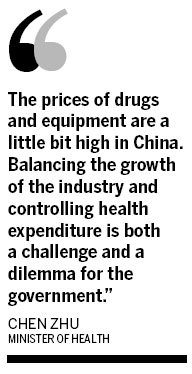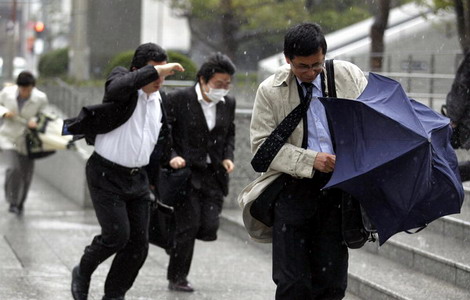 |
|
|
|
|||||||||
China, the world's biggest cigarette market, may suffer slower economic growth because of cancer and other chronic diseases that are hurting the labor force, Minister of Health Chen Zhu said.
Non-communicable diseases which cause prolonged sickness are responsible for four out of five deaths in China, compared with about 63 percent globally, and absorb about 70 percent of the nation's health spending, Chen said in an interview on Monday. Fighting the threat requires tighter scrutiny of the tobacco industry, linked to 1 million deaths in China, he said.

China's gross domestic product has grown an average 10 percent a year for the past three decades, transforming the nation into the world's biggest exporter and replacing Japan as the second-biggest economy after the US. The same time, the country now counts more than 90 million diabetes and 120 million chronic kidney disease sufferers - the most in the world.
"If we don't curb the fast rise of chronic diseases in China, it will have an impact not just on people's health, but also on society and the economy," Chen said in Hainan province, where he is attending the Boao Forum for Asia. "It could affect the continuity of our economic growth because a lot of deaths caused by chronic diseases are in people younger than 60."
The government wants to improve the efficiency of health services as it grapples with a rising incidence of life-long diseases.
$558 billion cost
Unless preventative steps are taken, early deaths from so-called non-communicable diseases such as heart disease, stroke, diabetes and cancer will crimp China's national income by $558 billion in the decade ending 2015, according to the World Health Organization. Half of sufferers who die of chronic diseases are under 65 years of age, according to the World Bank.
China will consider expanding its healthcare workforce and increasing resources near major cities to improve access, Chen said.
The government will also look at introducing standards to ensure quality isn't compromised amid a new tendering system tested in East China's Anhui province that encourages drugmakers to compete for State contracts to supply essential medicines.
"In evaluating the essential medicines, we need to put quality as the priority and not just the price," Chen said. "The prices of drugs and equipment are a little bit high in China. Balancing the growth of the industry and controlling health expenditure is both a challenge and a dilemma for the government."
Tobacco also presents another dilemma in China, the world's biggest producer and consumer of the aromatic leaves, accounting for 38 percent of cigarettes smoked worldwide in 2009.
"The commercial activities of the tobacco companies should be totally separate from administrative supervision," Chen said.
"One of the key aims is to enhance the government's supervision of the commercial activities related to tobacco," he said.
By Bloomberg

|

|

|

|

|

|